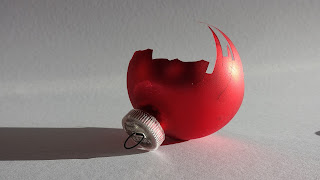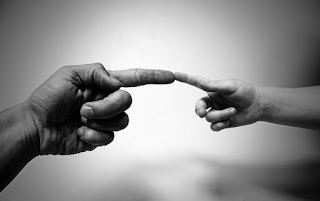Boundaries and Toxic Family: Should You Go No-Contact (Part 2)
When you hear the term "toxic" applied to family, you probably think, "mine aren't that bad", but chances are if you've even considered that your family members might be harming you, they are probably toxic.
There is of course, a spectrum to toxicity but that same spectrum doesn't correspond to the damage it causes. Sometimes the most innocuous abuse causes the most damage. So let's define toxic first.
Toxic applies to any word or action that undermines your sense of self, worthiness, or safety. It leaves you filled with negative feelings about yourself, other people, and the world around you.
Let's look at some examples of toxicity.
2. For thanksgiving dinner every year, your mother always invites your uncle who molested you even though you ask her not to.
3. Your sister always insists you're overreacting when you confide in her about a problem you're having.
4. Your mother flirts with your boyfriend and makes suggestive comments about your sex life to him.
5. At family gatherings, your father always tells demeaning, shaming "funny" stories about you to get a laugh.
6. Your aunt food-shames you and says things like, "Are you sure you should have that", when you eat a dessert or other high calorie food.
7. Your father rubs up against you when no one is looking, and makes sexually suggestive remarks about you or your body.
Of course these are just a few examples of toxic family members and toxic behavior. Did you find yourself mentally "rating" them?
The point is not how "bad" each one is. The point is the reaction they elicit. And that is subjective. All of these are examples of highly toxic people harming their victims.
So the question is: should you go no-contact with such people.
The answer to this question may change over time. And with good reason - as you go through your healing journey, you change over time.
There is of course, a spectrum to toxicity but that same spectrum doesn't correspond to the damage it causes. Sometimes the most innocuous abuse causes the most damage. So let's define toxic first.
Toxic applies to any word or action that undermines your sense of self, worthiness, or safety. It leaves you filled with negative feelings about yourself, other people, and the world around you.
Let's look at some examples of toxicity.
Examples of Toxic Family Members
1. When you reveal you're planning to quit your job and start your own business, your family member says "Really honey? Are you sure that's such a good idea? You know how you are -accountability is not your strong suit. I just don't want to see you get hurt."2. For thanksgiving dinner every year, your mother always invites your uncle who molested you even though you ask her not to.
3. Your sister always insists you're overreacting when you confide in her about a problem you're having.
4. Your mother flirts with your boyfriend and makes suggestive comments about your sex life to him.
5. At family gatherings, your father always tells demeaning, shaming "funny" stories about you to get a laugh.
6. Your aunt food-shames you and says things like, "Are you sure you should have that", when you eat a dessert or other high calorie food.
7. Your father rubs up against you when no one is looking, and makes sexually suggestive remarks about you or your body.
Of course these are just a few examples of toxic family members and toxic behavior. Did you find yourself mentally "rating" them?
The point is not how "bad" each one is. The point is the reaction they elicit. And that is subjective. All of these are examples of highly toxic people harming their victims.
So the question is: should you go no-contact with such people.
The answer to this question may change over time. And with good reason - as you go through your healing journey, you change over time.
Toxic Group 1: Go No-Contact With Anyone Who Destroys Your Recovery
Cut all contact with any family member that says or does things that destroy your recovery process. There's no point in trying to heal if you keep permitting toxic people to re-injure you. Most likely this group will include first order abusers -the ones that sexually or physically abused you, or facilitated or concealed the abuse or encouraged you to submit to it and to conceal it to protect your abuser. It may also include people who directly attack your healing journey and engage in behavior to stop it entirely.
Interacting with people in this group causes serious, first-order re-injury and emotional harm. and you have a God-given right to protect yourself from them. You owe them nothing, no matter the familial relationship. If they behave like savages, you have to protect yourself from them accordingly. Make no mistake - if you keep exposing yourself to such people, you are allowing yourself to be seriously harmed and recovery will be impossible.
Toxic Group 2: Go No-Contact or Low Contact With Anyone Who Makes Recovery More Difficult
The people in this group are more impeders than destroyers. They are basically the ones that, while not destroying your recovery, impede it with their toxic commentary, undermining advice and shaming feedback. They GIVE you reasons to spend more time in your therapist's or coach's chair. Spend a few hours with this family member and your recovery can be set back weeks or months. While they may not destroy your recovery, they make it harder and most importantly, they hurt you. Contact with people in this group should be kept to a very low minimum, or eliminated entirely, if possible.
Toxic Group 3: The "Well-Meaning Fence-Straddlers"
These family members see themselves as "peace makers", and refuse to "take sides" between you and your abuser. They are the ones that encourage you to "just get along" and "let by-gones be by-gones" when it comes to your abuse history. To this end, they often persist in setting up scenarios where they put you and your abuser in the same room together at family gatherings. They will insist that they "love you both" and just want what is best for both of you. This is a lie.
Ask yourself this - if your friend had been raped, would you keep encouraging her to spend time with the rapist? Of course not. These fence-straddlers actually aren't straddling the fence at all - they are firmly on the side of the abuser. So if the relationship is positive in other ways, what should you do?
You might choose to have a frank talk with this person - tell them they have to stop asking you to attend functions where your abuser will be present. If they insist, tell them you will not attend. Tell them having contact with them is important to you, but not if the price is you must spend time with your abuser as well. This gives them the chance to see the situation from your perspective, which frankly, my dog Seymour could see and understand. If they refuse to change their behavior, go low contact with them, meaning you only spend time with them alone, or no contact entirely if you find the fact that they won't see your side so damaging that you can't endure spending time with them any longer.
It's Just a Few Times a Year- What Can It Hurt?
Subjecting yourself to contact with toxic family members amounts to self-abandonment. That little voice inside you is telling you "please don't let that person hurt me anymore" but you ignore that voice and allow the harm to take place. The message you tell yourself by doing so is devastating:- I'm not important
- It's ok for people to hurt me
- My safety is not important
- My feelings don't count
- My abuser's feelings are more important
- I'm not worthy of safe, affirming relationships
- I deserve to be treated abusively
Beloved, you deserve better - a thousand times better. You deserve to THRIVE. You can't do so with these abusive albatrosses chained around your neck. My hope for you is to free yourself from such toxicity and to fill your world with people who are good enough, who support your recovery and light up your world with joy - you deserve it. YOU are important.
There is hope!
Stephanie Shipp




Comments
Post a Comment